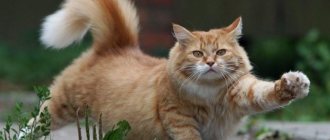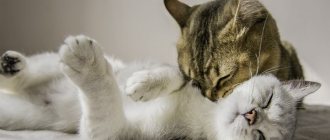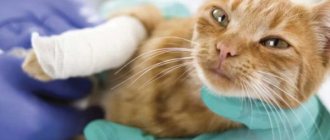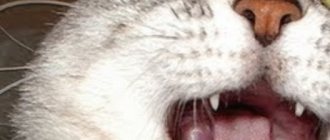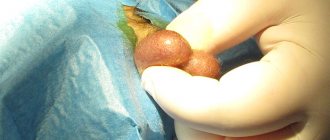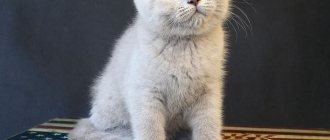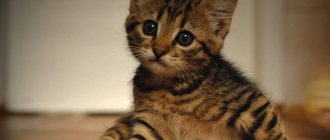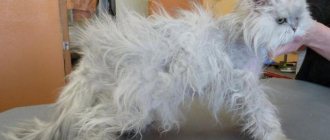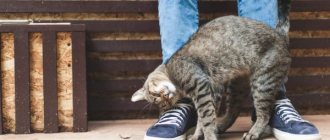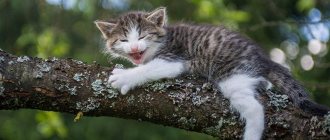How to determine obesity
To determine your pet's weight, you first need to weigh it. This can be done on ordinary human scales, first weighing yourself, and then picking up the animal in your arms. The normal weight of a cat depends on the breed standard, body build, age and gender. The situation is a little different with outbred animals, for which such standards do not exist, because they have a lot of blood mixed in them, which means that in appearance they can be radically different from each other. In this case, an external examination of the cat should help.
In an animal of normal weight, ribs, pelvic bones, and protruding vertebrae should not be visible, but they should be easily palpable. The body is proportional. There is a little fat on the stomach, the waist is visible.
In an overweight cat, the waist is barely visible, the ribs and spine are barely palpable, and a fairly large layer of fat is palpable on the chest and abdomen.
In an obese animal, the ribs and spine are practically not palpable due to fat, there is a very large round belly that sticks out from the sides when walking, a large layer of fat is palpable on the stomach and chest. An obese cat has difficulty walking. He becomes inactive and shortness of breath appears. Let's look at how to lose weight for an overweight cat below.
Inflammatory processes
Unfortunately, this group of reasons is also quite common. Inflammatory processes in the operated scrotum have a serious impact on the animal’s well-being, which is why the cat does not show interest in even the most delicious food. The development of inflammatory processes is associated with gross violations of the rules of asepsis and antisepsis during surgery.
In addition, there are situations when a cat quickly comes to its senses after the procedure, starts playing, runs outside, and does other “indecent things.” All this can lead to contamination of the cavity of the scrotal sac and its bacterial contamination. This is dangerous not only due to the possibility of developing an inflammatory process, but also due to septic and necrotic processes. And this is a direct threat not only to the health, but even to the life of your pet.
How do you know if your cat has had a bad surgery and needs to be seen by a veterinarian as soon as possible? Take a closer look at your pet.
You should be concerned if you see the following signs:
- The pet feels unwell, breathes heavily, eats little or refuses food altogether, but at the same time drinks liters of water. This is how the cat’s body tries to cope with the consequences of intoxication.
- Look at the scrotum area: if an inflammatory process has developed there, the organ swells, turns red, and exudate oozes from the wound canal. If the case is advanced, the animal smells bad, the animal’s general body temperature rises, the cat is depressed and tries to spend more time huddled in the most remote corner.
- The genital area looks extremely untidy, the fur in this area looks like icicles. It sticks together, being saturated with exudative secretions.
If you notice these symptoms, you should immediately take your cat to the veterinarian. If an animal in this condition is not provided with timely medical assistance, it may well die from sepsis. In such cases, it is necessary to excise areas of dead tissue. The animal is prescribed loading doses of broad-spectrum antibiotics and other antimicrobial drugs. In some cases, the use of anti-inflammatory corticosteroids is recommended. They improve and accelerate the regeneration process.
Obesity in sterilized cats
Sterilization of a cat is accompanied by serious hormonal changes in the body. Appetite increases, metabolism slows down, and activity decreases. The cat eats a lot and moves little, which is why it gradually develops obesity.
How can a cat lose weight in this case? After sterilization, it is important to monitor the amount of food the animal consumes. Out of pity, you should not give your cat as much food as she can eat. Feed should be given in the quantity indicated on the manufacturer’s packaging, in accordance with the age and weight of the animal. Gorging after surgery in a cat can last about two months.
Neutered cats often suffer from obesity. After the operation, they become lazy and inactive, the amount of food consumed does not decrease, and therefore problems with excess weight appear. We’ll look at how to lose weight for a neutered cat below.
What is the optimal weight for an adult cat?
Depending on the breed, the pet’s weight varies from 3 to 7 kg. Mature animals are usually fit and lean, especially if it is a male, who is losing weight and gaining weight constantly. The lifestyle of a healthy cat is active and dynamic. After “playing”, the pet wants to drink a lot, the animal eats abundantly, which has a positive effect on the digestive processes.
We recommend reading: How to Treat Allergies in Chinese Crested Cats
Dangerous symptoms of weight loss include:
- Lethargy, apathy . Sudden mood changes are evidence of anxiety. The cat feels bad and cannot find a place for itself, does not play and refuses food.
- Blood, frequent diarrhea . If the cat has lost weight and foreign inclusions are observed in the urine and diarrhea, you need to go to the clinic and have tests done.
- Bloating . Do not confuse high weight with a bloated stomach. The cat may become worse and worse due to internal swelling, infection, infection, which is why he does not eat.
Decreased activity
Physical inactivity is a decrease in the activity of the animal. It can be caused by various factors: sterilization, age, disease. Often cats who do not have access to the outside suffer from this. Street animals are constantly on the move: they hunt, look for food, fight with each other, and look for a partner to mate with. Domestic cats are deprived of all these joys. Their world is limited by the walls of the apartment, food is given to them by humans, and sterilized animals do not even think about reproduction. The only joy for them is to eat deliciously. Young animals can be active: rush around the apartment, play, jump on walls, but with age they become more and more lazy. As a result, indoor cats that do not go outside are more likely to become obese.
Physiological reasons for a cat losing weight
The condition of the animal is influenced by many factors, for example, living conditions, hormonal changes, character, changes in the cat’s life and others:
- Spring is the period when a cat needs to go for a walk, so food is often the last thing the animal thinks about. Its mass decreases at this time, but when all its needs are satisfied, it begins to recover.
- Changes in temperature: for example, before winter, mammals gain fat, losing it in warmer times.
- Any surprises in everyday life cause trauma to the animal. For example, having a child, moving, a new pet.
- A pregnant or postpartum cat usually has an excellent appetite as she feeds her babies. If there are too many kittens, the mother will lose weight, but after the end of the feeding period her weight will return to normal.
- Some breeds (Siamese, Abyssinians, Sphynxes, Bengals and others) have an excellent appetite, which does not affect their figure.
- The cat is sensitive to food, so changing food may not suit her at first, so she will experience a weight loss in the first week.
We recommend reading: Can Ringworm Bleed in a Cat?
If your cat is healthy but losing weight, there is no need to worry if he has:
- A specific breed - Somali, Abyssinian, Bengal.
- Active, mobile lifestyle.
- Age over ten years.
- Changes in life (moving to a new home, change of owners, new litter box)
If the pet is calm, but the weight loss is too sudden, then the following symptoms will be a sign of the disease:
- Changing your lifestyle from active to sluggish and apathetic.
- Drowsiness.
- The appearance of an unpleasant odor.
- Loss of tufts of fur, matting in tangles.
- Blood in excrement.
- Diarrhea, nausea or constipation.
- Pallor of the mucous membranes.
- Temperature increase.
Diseases that cause obesity
Some diseases of internal organs can cause excess weight in a cat. Obesity can be caused by problems with the stomach, intestines, liver, and gall bladder. Cats with diabetes often suffer from excess weight. Due to a lack of insulin, glucose metabolism is disrupted, which leads to obesity.
Another reason is hormonal imbalances resulting from problems in the thyroid gland. Due to excessive release of hormones or lack of them, the animal becomes less active and eats more.
Another reason is genetic predisposition. It has been noted that the offspring of overweight cats also have this problem. Can a cat lose weight in this case? If there is a genetic predisposition, it is important to constantly monitor the animal and its diet. If the situation is not controlled, the cat will quickly gain weight again. Such animals are prescribed a lifelong diet, and it is better to give them special food.
Problems with the nervous system, bones and muscles are the cause of decreased cat activity. In this case, you need to reduce the amount of animal feed.
Rehabilitation of a cat after castration
Hypothetically, excessive sleep may result in loss of energy after anesthesia. How can you tell if your cat is sleeping for a really long time? The average sleep requirement is 15–18 hours. If immediately after castration the cat sleeps for 20 hours or more, this is normal. The duration of sleep may increase as the cat experiences discomfort, weakness, and receives painkillers and antibiotics.
After surgery, it is recommended to provide the pet with warmth, comfort, and free access to food and water. Even if there is no appetite, the cat will drink and sleep. After about 10–12 hours, your pet will need to go to the toilet. Otherwise, low activity in the first days after surgery is quite normal.
Don't worry if your cat seems bored or inactive or refuses food or even water at first. It takes at least a day to recover from anesthesia.
You should worry if:
- The cat's ears are too hot or cold - constantly measure your pet's body temperature and keep it warm. Under anesthesia, a cat cannot control its temperature; fever indicates an inflammatory process.
- Dehydration is a common consequence of anesthesia. Almost immediately after recovery from anesthesia, the cat begins to drink, but with a large volume of fluid consumption, nausea occurs. To help your pet fight dehydration, it is recommended to instill 10-15 drops of Ringer's solution into the mouth. Such a small volume will not cause vomiting and will gradually restore the water-salt balance.
- Depression, irritability, depression - after castration, the cat should be prescribed pain relief. If this moment is missed accidentally or intentionally, the cat will be in pain, which will affect its condition.
- There is scarlet blood in the animal's urine - this symptom may indicate damage to the internal cavity of the genitourinary system, urolithiasis and other ailments.
- Prolonged constipation - the cat tries to empty its bowels, but cannot. In this case, laxatives are used.
- Swelling of the genitals is rare, but it does happen, especially in older animals. To reduce reporting, the cat is prescribed anti-inflammatory drugs and local therapy. If there is no swelling, no care of the incision site is needed. You just need to make sure that the cat doesn’t lick it.
Important! If you are unable to monitor your pet after castration, use a surgical collar.
Other digestive and body problems
It is worth noting that not only obesity can pose a danger to the animal. If a cat has lost a lot of weight, this means that he has serious health problems. It is worth paying attention to this, because exhaustion, like obesity, can be fatal.
If the cat does not eat anything and has lost weight, other symptoms of the disease should be noted. Perhaps the new food is simply not suitable for the animal. It is worth remembering that it is necessary to change food gradually, slowly increasing the amount of new and decreasing the amount of old. In addition, there is a possibility that the new food is simply not suitable for your pet. In this case, it should be replaced with another one.
If your cat's hind legs have lost weight, this may indicate kidney failure. In this case, you need to urgently consult a doctor. If a cat vomits and has lost weight, the following are possible: poisoning, infectious diseases, serious problems with the liver, kidneys, and gastrointestinal tract. Only a doctor can make an accurate diagnosis after examination. It is worth noting that if by summer the cat sheds a lot and has lost weight, there is no need to worry. The warm fur coat falls off, and the fat layer decreases, so the body does not overheat from high summer temperatures.
Dangerous and safe symptoms
You shouldn’t worry when your cat is thinner if he has:
- a certain breed - Bengal, Somali, Abyssinian;
- active lifestyle;
- age more than 10 years;
- change of lifestyle (moving, new litter box, new owner).
If the pet is in a calm state, but is suddenly losing weight, then the symptoms of the disease may be:
- drowsiness;
- At first the cat led an active life, then suddenly became lethargic and apathetic;
- loss of a large amount of hair;
- blood in excrement;
- nausea, constipation or diarrhea;
- heat;
- blanching of the mucous membranes.
Owners of older cats should closely monitor their condition and take them to the veterinarian if necessary.
When wondering why a cat is thin, and whether this is normal, factors such as normal and painful thinness are taken into account. In the first case, we are talking about the weight standard that an animal of a particular breed must meet at a certain age. The second is about exhaustion. A cat that is too thin is most likely sick and requires long-term rehabilitation therapy, which can only be prescribed by a specialist.
Appearance standards for British breeds
Poor nutrition
One of the main causes of obesity in cats is poor nutrition. Many owners are not aware of the proper nutrition of cats; they keep animals in accordance with established traditions (feed from the table) or buy advertised inexpensive food for the animal, which is often of extremely poor quality.
It is worth understanding that a cat is not a person, which means it cannot eat everything that people eat. Soups, borscht, boiled potatoes - all this is strictly contraindicated to give to an animal. Large chicken bones are downright deadly, as there are often cases where sharp pieces of bone have ripped open a cat’s throat. Chocolate is poisonous for cats.
Cheap economy-class food, which is sold in almost all stores, does not provide any benefit to the cat and can cause serious illnesses. The point is the low-quality components that are often included in the food. In addition, such food contains chemical impurities. Economy class food contains an additive that is addictive in cats. The animal pounces on food not because it is hungry, but because of the influence of a kind of drug on it.
Consequences of obesity
Obesity causes increased stress on the skeleton and internal organs of the animal, which causes the body to wear out faster. Due to pain in the joints and bones, the animal moves less, which further aggravates the situation.
Due to obesity, the number of fat cells that feed the blood increases, which means there are more blood vessels, and at the same time the load on the heart increases. Problems with the cardiovascular system begin, which can lead to heart failure or stroke.
Obesity increases the load on the kidneys, which can cause kidney failure and urolithiasis. Obesity in cats often leads to diabetes mellitus, which may well lead to blindness of the animal. The liver is also susceptible to obesity. This may lead to her refusal. According to statistics, obese cats live 2-3 years less than their thinner counterparts.
Treatment and diet
How can a cat lose weight? At the first sign of excess weight in a cat, you should contact a veterinarian. The doctor will examine the animal. If obesity is the result of internal problems in the cat’s body, the veterinarian will make a diagnosis and then prescribe treatment. The animal may have to be given injections and switched to special food. Often, treatment for cat obesity involves diet and increasing his activity. It is necessary to monitor the cat’s weight and record all changes. If your weight does not change, you need to see your doctor again.
Often, overweight animals are prescribed a special diet. However, this does not mean that your pet needs to be starved. The animal needs to be fed on a schedule, and not left food freely available all day. In order to reduce the volume of the stomach, food should be given more often, but in smaller portions. After eating, leftovers must be removed until the next time.
The animal must not be fed from the table. The cat's diet must contain meat, vegetables and cereals in the proportions specified by the veterinarian. Fish can be given only once a week, as it can cause the development of urolithiasis. In no case should the diet contain potatoes and rice, which contain a lot of starch. During the diet, you need to reduce the calorie content of food: exclude fatty chicken and beef. You can give chicken fillet, turkey, lean beef. It is necessary to temporarily remove fatty dairy products from your diet. In this case, kefir, low-fat yogurt, and cottage cheese will be useful. Vegetables include carrots, turnips and pumpkin.
Feeding after surgery
In order for your cat to recover quickly after surgery, you should monitor its diet. Proper nutrition is the key to a quick recovery and prevention of complications.
The cat does not drink water at all: what to do, why
During the first two days, the animal may not eat anything at all, and this is normal. During the first day, the cat should not be given solid food; it is better to cook broths or soups. On the second day, you should start feeding with soft food or crush the food into a puree. It is recommended to feed in small portions 3-4 times a day.
After surgery, the animal loses a lot of minerals and vitamins and it is very important to compensate for their deficiency in the body, so experts recommend buying special cat food that has high nutritional value and a balanced composition.
If the animal eats homemade food, then you should avoid foods with a strong smell and spices. It is also prohibited to give dry food during the postoperative period; it must be pre-soaked with water, but the main emphasis after the operation should be on eating canned meat and purees.
Important! When feeding your cat, you should make sure that the food is neither hot nor cold. It should be at a comfortable temperature for consumption.
Special feed
It is necessary to abandon low-quality dry and wet ready-made food. Only premium and super premium food is beneficial. Some manufacturers have special foods for obese cats. They must be given by weight in accordance with the manufacturer's recommendations.
If you feed your cat only prepared food, you should not give him natural food. Ready-made food contains all the vitamins and minerals necessary for a complete diet and is designed for constant feeding. Mixed feeding will lead to an imbalance of individual components, which will have a detrimental effect on the pet’s health.
How to increase your cat's activity
Cats are predators and hunters, and therefore they need constant physical activity. Street animals live full, active lives and rarely have problems with obesity, while indoor cats suffer from idleness.
How to make a cat lose weight? The animal should have enough space where it can jump, run and play. Ideally, it is advisable to make special shelves on the wall for the cat, on which he can jump, or you can buy a whole play complex.
The cat must have toys. They often enjoy playing until they are very old, especially if the owner is directly involved in this. Anything that rings, fluffy, or rustles attracts the attention of cats, and if it also moves, the animal’s hunting instinct is immediately triggered.
You need to play with your cat a lot so that he spends extra calories. A cat, like a dog, can be taken outside on a leash. Naturally, this can only be done if the animal has all the necessary vaccinations. At first, the cat may be afraid of the street and cling to the owner’s body. You need to accustom the animal gradually, walking it a little every day, first in your arms, and then you can lower it to the ground. You should make sure that the harness and leash are reliable, and you shouldn’t let go of the leash, because domestic cats are often shy and can run away at any moment. Unlike dogs, they do not understand commands, and therefore you need to keep a better eye on them on the street.
Castration of cats: indications for surgery
In the case of the myth about excess weight in cats after castration, smoke appeared not without fire. The changes happen very smoothly, so many owners don’t even have time to notice how their fit, playful cat becomes a cute little bun who only eats and sleeps.
How quickly the body begins to rebuild depends on the age at which castration was performed. According to general recommendations, castration is best done when the kitten is 6–7 months old, but has not yet entered into heat (up to 9–10 months).
You need to understand that normally, a kitten’s testicles descend into the scrotum while still in the womb. At the age of 4–5 months, the pet experiences the first hormonal surge, caused by the natural processes of formation of the body. When a cat enters into sexual heat, it experiences another hormonal surge, or rather a failure, after which the body stops and, one might say, becomes an adult.
If the cat was castrated before the first failure, that is, at the age of 3-4 months, his temperament and habits will practically not change. Many veterinarians are against early castration, but European experience shows that both females and males tolerate the procedure without complications and recover faster.
Castration at the age of 6–9 months is approved by the vast majority of veterinarians, since the kitten has already developed physically, but its body has not had time to rebuild. In this case, the changes after castration are insignificant. The body takes the longest to rebuild if the cat was castrated at the age of over a year or after mating.
Now let's figure out what exactly is changing. When in a state of heat, the cat spends a lot of energy searching for a partner. The pet marks, screams, sleeps poorly, and is constantly in a state of stress. The longer the cat walks in vain, the more stress builds up... that is, the body constantly consumes energy and requires its replenishment.
If a cat is released outside during the heat period to find a partner, its energy needs increase incomparably. Being in conditions of competition for the right to mate, the cat is not only stressed, he is forced to fight, constantly control his territory... and it is not a fact that the male will achieve his goal. The female will choose the strongest cat, and whoever is stronger will decide in a fight.
Now imagine that you went to the gym for more than a year, ran, swam, but suddenly gave up everything. However, the quality and quantity of food you consumed remained unchanged. What will happen? Of course, you will gain weight, and very quickly.
What can you do to protect your cat from gaining weight and keep him healthy? To begin with, let’s define that obesity is not a nice feature, but a disease that affects the functioning of the heart and the condition of the skeleton. Cats are not naturally fat and cheeky. Cats are nocturnal predators, muscular, fit, agile and very fast animals.
If you castrated a cat at the age of 1 year or older, you will have to work not only on the diet, but also on gradually reducing the amount of daily food required. As soon as you notice that the cat has begun to gain weight, the calorie content of its diet should be reduced by 20–30%.
It is important that the portion size does not change at first. Correct correction of the diet requires time and attention from the owners. If you don’t have time to count calories and monitor your pet, there is an alternative - mixed food for neutered cats.
The difficulty is that it is impossible to determine exactly when your pet’s body will begin to change. The only method that allows you to timely track the increase in fat mass is regular weighing. It should be borne in mind that cats gain a little weight in the winter and lose weight in the summer.
A castrated cat needs to move and get physical exercise, this condition also applies to non-castrated pets. The myth that neutered cats don't like to play is pure fiction. After castration, the pet’s body, or more precisely, its hormonal system will come into balance.
At the same time, you will notice that the character of an adult, brutal cat has become similar to a teenage one - curious, sociable. playful. After castration, the cat should be encouraged for its desire to play, run and fool around. Try to provide your pet with a variety of toys and, most importantly, spend time communicating.
Castration is a simple surgical operation in which the gonads (testicles, testes) are removed from males. The main purpose of the operation is to deprive animals of reproductive function.
It is best to castrate cats after puberty, at the age of 8-10 months. Earlier castration can lead to serious complications and consequences, which often end in death. If you castrate a cat after the pet has already had contact with cats, the sexual instinct may remain, and the cat will continue to be interested in individuals of the opposite sex.
As a rule, veterinarians recommend castration for cats that are not of breeding value. Often cats are castrated after being removed from breeding, but as already noted, in this case castrated males may continue to show interest in cats.
Castration of cats is necessary:
- if the cat asks to go outside, constantly meows during the period of sexual heat;
- shows aggression during the rut;
- to prevent unwanted litters;
- leaves its marks in the house, apartment, entrance.
In some cases, the operation has medical indications (injuries of the scrotum, testes, cryptorchidism, congenital pathologies).
It is also worth noting that unneutered cats who do not have contact with cats can suffer from prostatitis. Such pets have an increased risk of developing urolithiasis.
Castrated animals live 65-70% longer than their non-castrated relatives. Viral and bacterial diseases and infections (herpes virus, chlamydia) are transmitted sexually.
In addition, if you constantly give males oral hormonal contraceptives, drugs to reduce sexual desire, or adjust behavior during the rut, the risk of developing tumors increases and hormonal levels are disrupted.
Useful materials:
- Cutaneous horn General description of the disease Cutaneous horn on the forehead or face (ICD 10 code - L57.0) -...
- Itching and odorless discharge Main causesBefore considering the factors that provoke the appearance of discharge that has a sour odor, it is necessary to immediately note...
- Normal temperature in animals Normal temperature in different types of animals Veterinary services Day hospital for animals Veterinary certificates Vaccination…
- Discharge in women What kind of discharge between menstruation is considered normal? Female discharge normally consists of mucus from the cervical canal, dead...
Tips for the owner
Don't be fooled by your cat's hungry look when he begs for food. The animal must be fed strictly in accordance with the manufacturer's recommendations. Feeding is not an expression of love. It is better to spend more time playing with your cat and his health.
Don't skimp on your pet. Cheap food only spoils the health of the animal. Feeding him from the table is contraindicated. It is worth ignoring sad looks and pitiful meows. If you are particularly persistent, you need to take the cat to another room. And under no circumstances should you give up on this issue, because showing weakness once will show the cat that he is doing everything right.
Excess weight in a cat is a serious problem that cannot be ignored. Obesity can lead to many health problems and, in the worst case scenario, death. We looked at how a cat can lose weight at home; the owner can only follow all the recommendations and get his animal in order.
Anesthesia as a cause of lack of appetite
As a rule, today veterinarians try to perform castration using general anesthesia. This is especially true for animals whose sterilization is carried out at the age of more than a year. In this case, the risk of painful shock and all the unpleasant consequences associated with it is quite high.
General anesthesia allows you to completely numb the surgical field and also eliminates many problems associated with the need for careful fixation. The cat, no matter how much it wants, will not be able to escape from the operating machine, and therefore will not cause injuries or mutilation to itself.
But still, anesthesia is not ideal. In particular, many animals have a rather difficult time recovering from the effects of general anesthesia, they wake up for a long time after surgery, at which time their coordination of movements is noticeably impaired, there is no appetite, etc.
It happens that cats castrated at the age of four to five years remain in a “comatose” state for a week. They eat poorly, sleep a lot, and tend to move less. True, this rarely happens. More often than not, animals fully recover from the consequences of surgery within two to three days.
All these phenomena are temporary and go away on their own after some time. As a rule, medical assistance is not required for this. How can you tell if your cat is eating poorly because of the effects of general anesthesia? It's pretty simple:
- The animal took a long time to wake up after the operation; by the end of the first day after awakening, problems with coordination of movements persisted. For example, for this very reason, some cats cannot use the litter tray normally and do “their business” past it.
- The pet was vomiting and was very thirsty. All this indicates a severe reaction of the animal’s body to the drugs used during general anesthesia.
Be that as it may, if these signs appear, we would strongly advise taking your pet to a veterinarian.
This will not be superfluous: at least you will make sure that everything is fine with the animal, and its long “hibernation” is the result not of pathology, but of an inadequate response of the animal’s body to the action of anesthetic drugs.
By the way, for how long can a pet not eat after surgery? There will be no negative consequences for the cat’s body if he has not eaten anything (or almost nothing) for 2 days. But in cases where an animal starves for more than two days, nothing good awaits it. We strongly recommend that you take your pet to a veterinarian. It is likely that intravenous administration of nutrient solutions will be required to prevent your cat from starving to death and to minimize the negative effects of hunger on his body.
Important! We remind you once again that any hunger strike that lasts 3 days or more is very dangerous for the cat’s health.
Individual intolerance to anesthetic drugs
Unfortunately, not all animals tolerate the effects of drugs used for anesthesia or even local anesthesia well. The resulting side effects can be so severe that the pet is completely off the food and prefers to drink a lot.
How to understand that the problem is precisely the inadequate reaction of the cat’s body to medications? As a rule, this is accompanied by the development of quite specific clinical signs:
- Firstly, immediately after emerging from anesthesia, the animal vomits profusely, and the vomit is foamy, sometimes slightly tinted yellowish.
- Vomiting is often accompanied by diarrhea. The stool also has a thin consistency and may be foamy.
- Of course, in this case, the cat does not eat well after castration, preferring to drink liters of water.
All visible mucous membranes may turn blue, as well as a decrease in overall body temperature. These are very bad signs, as they indicate serious poisoning or an allergic reaction that has occurred in the pet’s body to the administration of medications. In any case, the cat needs to be shown to a veterinarian. The sooner you do this, the greater the chances of a successful completion of the matter.
